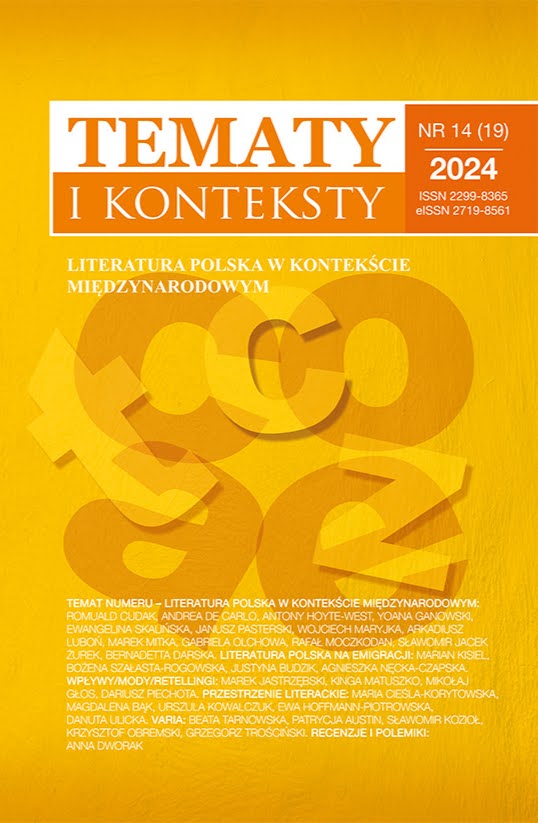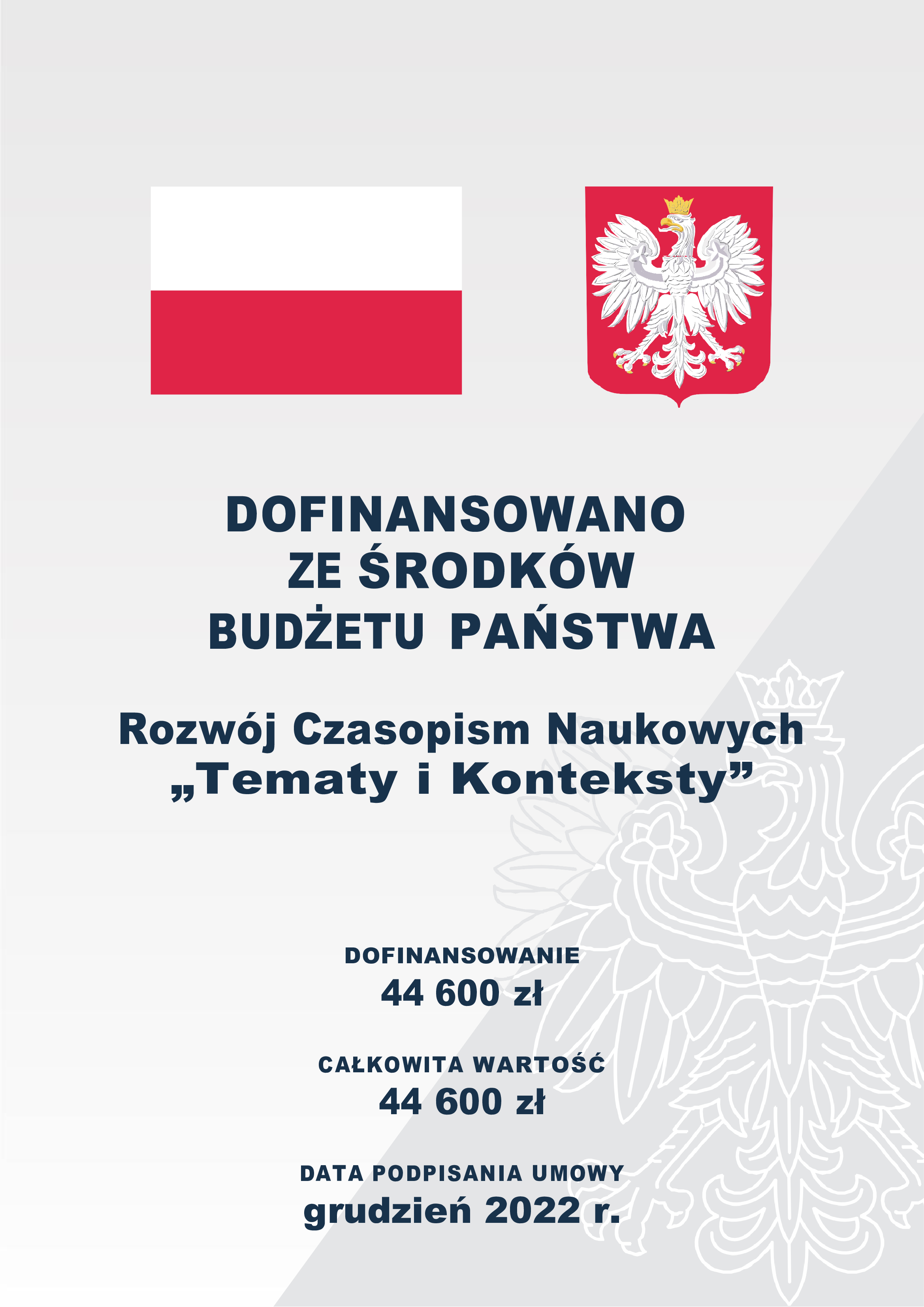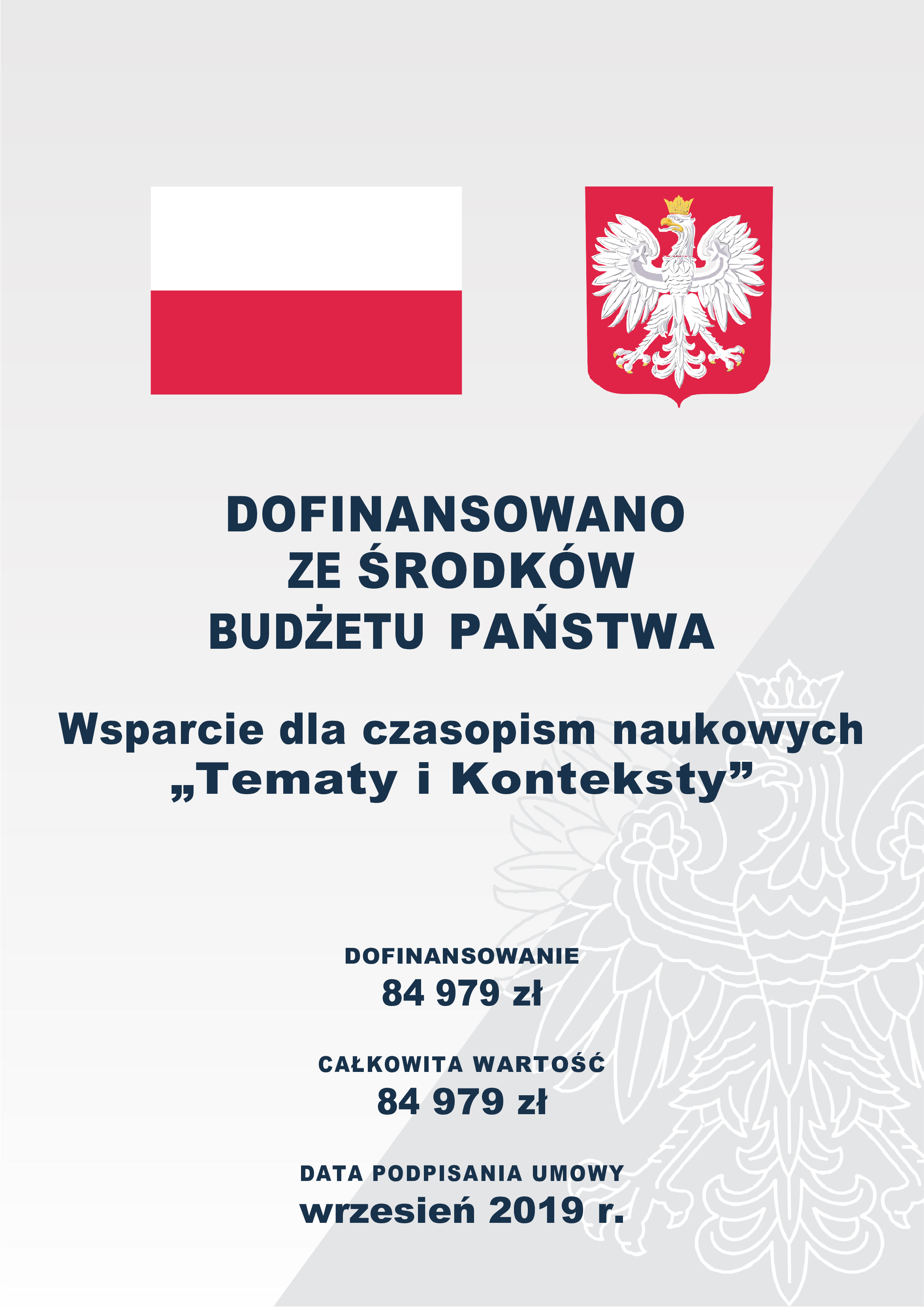“Jimmy didn’t envy him. (He envied him.)”: Social and personal consequences of liberal eugenics in Margaret Atwood’s "MaddAddam" trilogy
DOI:
https://doi.org/10.15584/tik.2024.29Keywords:
Margaret Atwood, MaddAddam trilogy, liberal eugenics, Jürgen HabermasAbstract
The article interprets Margaret Atwood’s MaddAddam trilogy as an important, critical voice in the debate over desirability of liberal eugenics – genetic programming of children that is regulated only by the market forces of supply and demand. Arguing that the trilogy indicates potential effects of liberal eugenics on both the functioning of society and an individual’s sense of self, the article refers to a number of theoretical texts coming from the fields of bioethics, social psychology and anthropology, but its primary source of argumentation lies in the philosophy of Jürgen Habermas.
Downloads
References
Atwood M., Arguing Against Ice Cream: Enough: Staying Human in an Engineered Age by Bill McKibben [in:] In Other Worlds: SF and the Human Imagination, New York: Doubleday, 2011, pp. 128-140.
Atwood M., MaddAddam, London: Virago, 2013.
Atwood M. Oryx and Crake, London: Hachette Digital, 2009 (2003).
Atwood M., The Year of the Flood. London: Hachette Digital, 2010 (2009).
Bergthaller H., Hannes, Housebreaking the Human Animal: Humanism and the Problem of Sustainability in Margaret Atwood’s Oryx and Crake and The Year of the Flood, “English Studies”, Vol. 91, No. 7, 2010, pp. 728-43. DOI: https://doi.org/10.1080/0013838X.2010.518042
Buchanan A., Better than Human: The Promise and Perils of Enhancing Ourselves. Oxford: Oxford University Press, 2011.
Buchanan A., D. W. Brock, N. Daniels, and D. Wikler, From Chance to Choice: Genetics and Justice, Cambridge: Cambridge University Press, 2000. DOI: https://doi.org/10.1017/CBO9780511806940
Canavan G., 2012. Hope, But Not for Us: Ecological Science Fiction and the End of the World in Margaret Atwood’s Oryx and Crake and The Year of the Flood, “Literature Interpretation Theory”, Vol. 23, No. 2, 2012, pp. 138-59. DOI: https://doi.org/10.1080/10436928.2012.676914
Canguilhem G., The Normal and the Pathological, translated by Carolyn R. Fawcett and Robert S. Cohen, New York: Zone Books, 1991.
Cooper M., Life as Surplus: Biotechnology and Capitalism in the Neoliberal Era. Washington: University of Washington Press, 2008.
Dumit J., Prescription Maximization and the Accumulation of Surplus Health in the Pharmaceutical Industry: The BioMarx Experiment, [in:] Lively Capital: Biotechnologies, Ethics, and Governance in Global Markets, K. Sunder Rajan (ed.), Durham and London: Duke University Press, 2012, pp. 45-92. DOI: https://doi.org/10.1215/9780822393306-002
Ferreira M. A., “Toward a Science of Perfect Reproduction”?: Visions of Eugenics in Contemporary Fiction, [in:] Restoring the Mystery of the Rainbow: Literature’s Refraction of Science, V. Tinkler-Villani and C. C. Barfoot (eds), Leiden: Rodopi, 2011, pp. 395-415. DOI: https://doi.org/10.1163/9789401200011_022
Guillaumin C., Racism, Sexism, Power and Ideology, London and New York: Routledge, 1995.
Habermas J., Between Naturalism and Religion: Philosophical Essays, translated by Ciaran Cronin, Cambridge and Malden: Polity Press, 2008.
Habermas J., The Future of Human Nature, translated by Hella Beister and Max Pensky, Cambridge and Malden: Polity Press, 2003.
Harris J., Enhancing Evolution: The Ethical Case for Making Better People, Princeton: Princeton University Press, 2007.
Huxley A., Brave New World. New York: Vintage, 2006.
Jones N., Embodied Ethics: From the Body as Specimen and Spectacle to the Body as Patient, [in:] A Companion to the Anthropology of the Body and Embodiment, F. E. Mascia-Lees (ed.), Malden and Oxford: Wiley-Blackwell, 2011, pp. 72-85. DOI: https://doi.org/10.1002/9781444340488.ch4
Mukherjee S., The Gene: An Intimate History, New York: Scribner, 2016.
Owens T. J. and S. Samblanet, Self and Self-Concept [in:] Handbook of Social Psychology. Second Edition, J. DeLamater and A. Ward (eds), Dordrecht: Springer, 2013, pp. 225-250. Pusch A. F., Splices: When Science Catches Up with Science Fiction, “Nanoethics”, 2015, vol. 9, pp. 55-73. DOI: https://doi.org/10.1007/s11569-014-0216-8
Shelley M., Frankenstein, Seattle: Amazon Classics, 2017. DOI: https://doi.org/10.2307/j.ctv3405qhx.5
Sparrow R., A Not-So-New EUGENICS: Harris and Savulescu on Human Enhancement, “The Hastings Center Report”, 2011, Vol. 41, No. 1, pp. 32-42. DOI: https://doi.org/10.1002/j.1552-146X.2011.tb00098.x
Warkentin T., Dis/Integrating Animals: Ethical Dimensions of the Genetic Engineering of Animals for Human Consumption [in:] Leonardo’s choice: Genetic Technologies and Animals, C. Gigliotti (ed), Dordrecht: Springer, 2009, pp. 151-172. DOI: https://doi.org/10.1007/978-90-481-2479-4_9
Downloads
Published
How to Cite
Issue
Section
Categories
License
Copyright (c) 2024 Tematy i Konteksty

This work is licensed under a Creative Commons Attribution-NonCommercial-NoDerivatives 4.0 International License.




